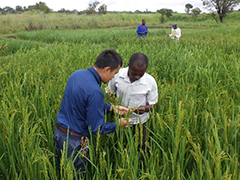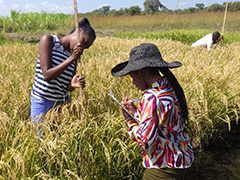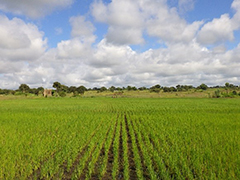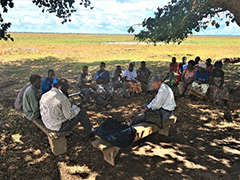MOReDeP Project Activity 1 - Research and Technology Development (2022-01-04)
The purpose of the Market Oriented Rice Development project (MOReDeP) is to increase farmers' income through promoting rice production in Zambia. For this purpose, MOReDeP has been conducting a number of activities, including 1) researching and developing rice cultivation techniques that are flexible and favorable to various ecologies in Zambia, 2) formulating "Rice Clusters" while conducting extension activities to spread the use of the techniques across farmers, and 3) enhancing farmers' knowledge and business skills to improve their income by selling produced rice. The following three articles introduce our main project activities.
The productivity of rice production in Zambia or the crop yield (the amount of agricultural production harvested per unit of land area) is 1.20 ton / hector (ton/ha). It is quite low, even comparing to other African countries not very actively producing rice[1]. Total rice production is small due to this low productivity, as well as the small number of rice farmers (and the small rice cultivation area). Low productivity is not because the natural environment is not suitable for rice production. Our survey with rice farmers shows that the basic cultivation and harvest/post-harvest processing techniques practiced by farmers are the problem. For instance, 66% of farmers never do weeding or only once, while it should be done at least twice in a standard condition[2]. Also, farmers use impure low quality rice seeds, which contain 46% seeds of varieties (or foreign matters) farmers do not intend to plant and grow[3]. For such problems found by the survey, MOReDeP has been working with the Zambia Agriculture Research Institute (ZARI). Through the collaboration with their researchers - and developing the rice research capacity in Zambia - MOReDeP's Japanese rice experts has been researching to find solutions to the problems and working on the development of rice production techniques that are flexible and favorable to the various ecologies in Zambia. In the last a few years, the project has already developed a package of techniques, "Good Rice Practice" (GRiP), which consists of various modules to enable each farmer to select techniques and assemble a package tailored to their individual cultivation environment. In the years ahead, the project will further proceed with the research and development and, by incorporating the outcomes into the GRiP, pursue higher productivity of rice production in Zambia.
Notes
[1] The productivity of rice production in Africa region is 2.27 ton/ha. Kennya is 6.84 ton/ha, which is the highest in the Africa region, and Japan is 6.83 ton/ha (FAO 2019)
[2] Weeding is critical to prevent losses in crop yield. In case that weeding is not sufficiently done and rice and weeds grow together in the same field, they would compete for sunlight, nutrients, and water and the rice would not be grown as it could be.
[3] Our examination of the rice seeds used by farmers found that the purity rate of the seeds is only 54%. The duration required for maturity differs from one variety to another. Since 46% of the seeds are of different varieties from the variety farmers intend (or foreign matters), the 46% of rice may be immature or too matured even if 54% are matured. As the result, 46% of the rice may be harvested at the inappropriate timing and thus the productivity decreases.

MOReDeP Japanese experts and ZARI's researchers at the experimental field

ZARI's researchers conducting a growth survey

Seed production field at the research station

MOReDeP Japanese experts discussing with rice farmers
